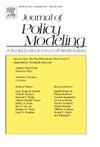Autocratic governance and decentralization in non-democratic regimes: China’s case study
IF 3.1
2区 经济学
Q1 ECONOMICS
引用次数: 0
Abstract
This research article examines the intricate dynamics of transitioning from a centralized to a decentralized governance system, with a specific focus on the autocratic context, using China as a prominent case study. The central argument centers on the concept that autocratic leaders face a challenging holdup problem when implementing sustainable development policies. In situations where effective mechanisms for establishing credible policy commitments are lacking, centralized decision-making often fails to accurately exhibit local preferences, eroding inducements. Decentralization emerges as a powerful mechanism for ensuring sustainable policy commitment by aligning fiscal policies with individual preferences, potentially enhancing efficiency. Our research sheds light on the motivations for autocratic rulers to opt for decentralization as a means of overcoming the challenges associated with centralized decision-making and fostering improved alignment between sustainable development policies and local residents' preferences and productive efforts.
非民主政体中的专制治理和权力下放:中国案例研究
这篇研究文章考察了从集中式到分散式治理体系过渡的复杂动态,特别关注专制背景,并以中国为突出案例研究。核心论点集中在专制领导人在实施可持续发展政策时面临具有挑战性的拖延问题这一概念上。在缺乏建立可信政策承诺的有效机制的情况下,集中决策往往不能准确地显示地方偏好,从而削弱了诱因。权力下放是一种强有力的机制,通过使财政政策与个人偏好保持一致,从而确保可持续的政策承诺,从而潜在地提高效率。我们的研究揭示了专制统治者选择权力下放的动机,将其作为克服中央集权决策带来的挑战的一种手段,并促进可持续发展政策与当地居民的偏好和生产努力之间的更好的一致性。
本文章由计算机程序翻译,如有差异,请以英文原文为准。
求助全文
约1分钟内获得全文
求助全文
来源期刊

Journal of Policy Modeling
ECONOMICS-
CiteScore
6.20
自引率
11.40%
发文量
76
期刊介绍:
The Journal of Policy Modeling is published by Elsevier for the Society for Policy Modeling to provide a forum for analysis and debate concerning international policy issues. The journal addresses questions of critical import to the world community as a whole, and it focuses upon the economic, social, and political interdependencies between national and regional systems. This implies concern with international policies for the promotion of a better life for all human beings and, therefore, concentrates on improved methodological underpinnings for dealing with these problems.
 求助内容:
求助内容: 应助结果提醒方式:
应助结果提醒方式:


